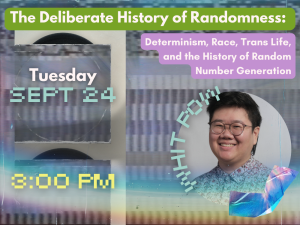
Event Details
- This event has passed.
Whit Pow in Conversation with Sheila Murphy | The Deliberate History of Randomness: Determinism, Race, Trans Life, and the History of Random Number Generation
Whit Pow, Assistant professor of Media, Culture, and Communication at New York University

Event Abstract: There is something deliberate about the history of randomness. Computers are often described as “deterministic”: every process that is performed by a computer is pre-determined, with often formulaic outcomes. “Determinism” is also a historically loaded word—one that has been paired with the term “biological” to justify eugenicist thought related to race, disability, and queer and transgender life. What might it mean, then, to place these meanings side-by-side, connecting the long history of ideological determinism in relationship to race, gender, and sexuality in the United States alongside the use of determinism in computer science and programming?
Using previously unseen video from the School of the Art Institute of Chicago’s archives along with the 1978 glitch art piece Digital TV Dinner, I examine the randomized imagery and glitch art produced by the Bally Astrocade, a video game console and home computer whose software was developed in 1978 by trans programmer and game designer Jamie Faye Fenton. I trace this history of the random through computers, hardware random number generators like lava lamps and atmospheric noise from radio waves, the United States census, and the roots of random number generation in eugenicist thought in the United States.
Speaker Bio: Whit Pow (they/them) is an assistant professor of Media, Culture, and Communication at New York University. Their work focuses on queer and transgender (trans) histories of games, computational media and electronic art. Their latest article, “How the Computer Taught Us to See,” will be published this fall in Camera Obscura by Duke University Press.
How to Participate: We want to make our events accessible to all participants. This event will be a hybrid event with both a physical meeting space and an online meeting space. Please register in advance for the online Zoom Webinar here: https://bit.ly/3YyzMJN
Please register for the physical meeting space at the University of Michigan’s Central Campus here: https://myumi.ch/egGZr
CART will be provided. If you anticipate needing additional accommodations to participate, please email Eric Mancini at [email protected]. Please note that some accommodations must be arranged in advance and we encourage you to contact us as soon as possible.


